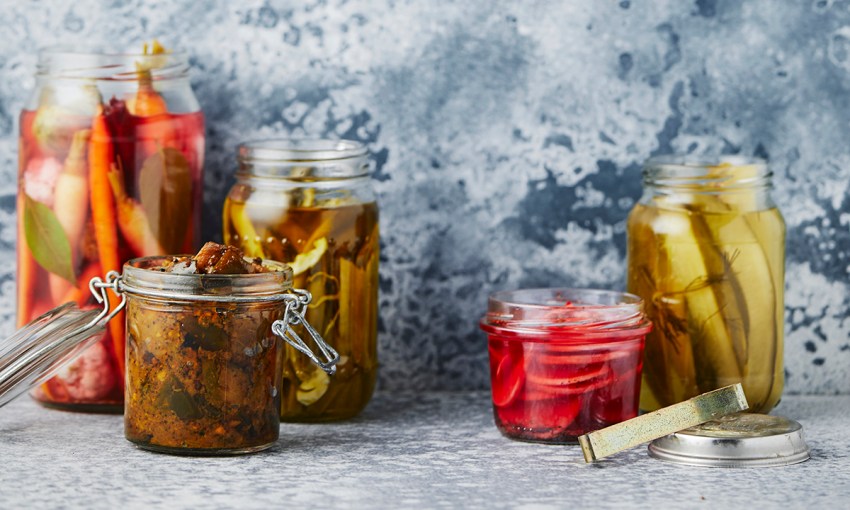Pickling and fermenting is not only a relaxing activity – it's good for you. In the latest in our One Small Step guides to better living in South Australia, here's how to get started making your own pickles and a range of local workshops to learn more.
Zest up your life with pickling and fermenting
Pickling principles
Pickling and the more complex process of fermentation are both ancient methods of preserving fresh produce.
A pickle preserves vegetables or fruit by immersing them in an acidic solution, with salt and/or sugar added, to create that addictive zesty flavour.
Fermentation is a chemical process whereby sugars are broken down by yeasts and other microorganisms to produce ethanol, carbon dioxide and aromatic compounds. The process also produces complex flavours, that often improve over time, and beneficial probiotics.
Fermentation produces some of the world’s most loved consumables – from beer and wine, to chocolate, bread and cheese.
At home, you can utilise the power of fermentation to turn your own produce – or that purchased from your local market or fruit and veg shop – into healthy, long-life, and delicious additions to your pantry.
Learn from the experts
If you want to get some expert advice on how this all works, South Australia has a growing number of people teaching the principles and practicalities of pickling and fermentation.
My Grandma Ben at Plant 4, Bowden, runs regular pickling workshops, alongside a cafe and catering operation.
The enterprise is owned by former Mastership contestant Jessie Spiby, who says pickling, preserving and fermenting allows her to extend the enjoyment of seasonal produce throughout the year.
“We’re currently pickling 100kg of zucchinis,” she told SALIFE.
“We are continuously aiming to reduce our food waste in the cafe, and pickling and fermenting are great ways to bring a second life to veggies that might otherwise be wasted.
“Our hands-on seasonal pickling and fermenting workshops go through all the basic pickling, canning and fermenting techniques to arm you with the tips and tricks needed to start preserving like a pro from home.
“We love how everyone takes their own approach and ends up with their own unique jars of pickles to take home. We also run kimchi and dumplings and chilli preserving workshops for something a little different.”
The next workshop will be held on Sunday, March 22. Details here.
More workshops are on the way.
Gut Feeling Fermentation runs workshops down south, including an introduction to fermentation session coming up on March 31.
The workshop, to be held at the Fleurieu Pantry in Port Noarlunga, will introduce participants to the principles of fermentation, with everyone taking home a batch of sauerkraut.
Attendees will also be given a Kombucha scoby – the culture needed to make the drink-of-the-moment – and advice on how to create the fermented beverage at home.
Bookings and details here.
The appropriately-named Remedy Bliss specialises in raw and fermented food and runs a series of classes on pickling vegetables, making kimchi, kefir (a fermented drink that Remedy makes from coconut water) and more.
Unley breakfast and lunch spot Pickle in the Middle – obviously experts in the field – conduct pickling workshops, promising to help you express some creativity through the process. Go here for the workshop schedule.
Get pickling today
As autumn approaches, there is an abundance of garden produce to pot and jar for the leaner months ahead.
Make the most of the bounty, with these pickle recipes from Rosa Matto.
Quick cucumber pickles
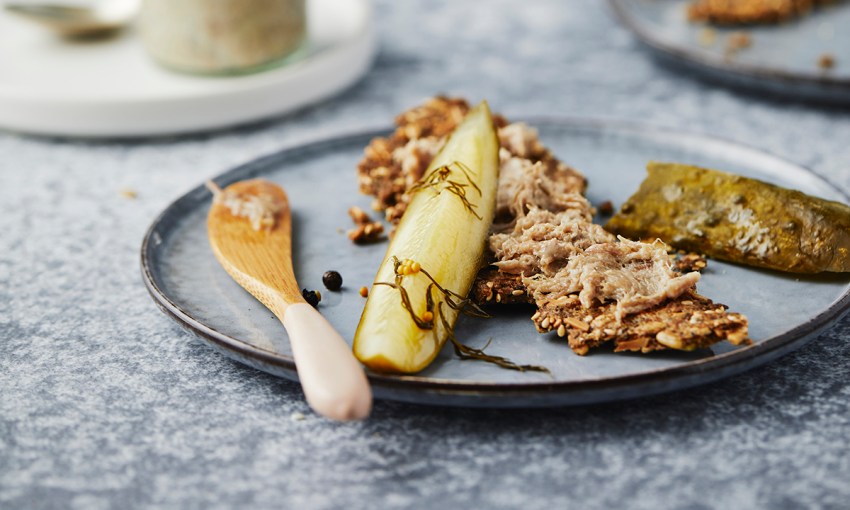
6 pickling cucumbers or Lebanese cucumbers, cut in half or quarters lengthways
salt
2 tbsp caster sugar
2 tbsp white wine vinegar
½ tsp each caraway seeds and peppercorns
2 tbsp chopped fresh dill
Place cucumbers in a colander over a bowl. Add 2 level teaspoons sea salt, combine. Cover. Place a heavy weight on top and set aside for 1 hour to drain. Do not rinse. Transfer cucumbers to a bowl and stir in sugar dissolved in the vinegar. Add caraway seeds, peppercorns and fresh dill. Refrigerate for at least 2 hours or overnight to allow the flavours to develop and then serve.
Garden pickles (giardiniera)
Makes 1kg
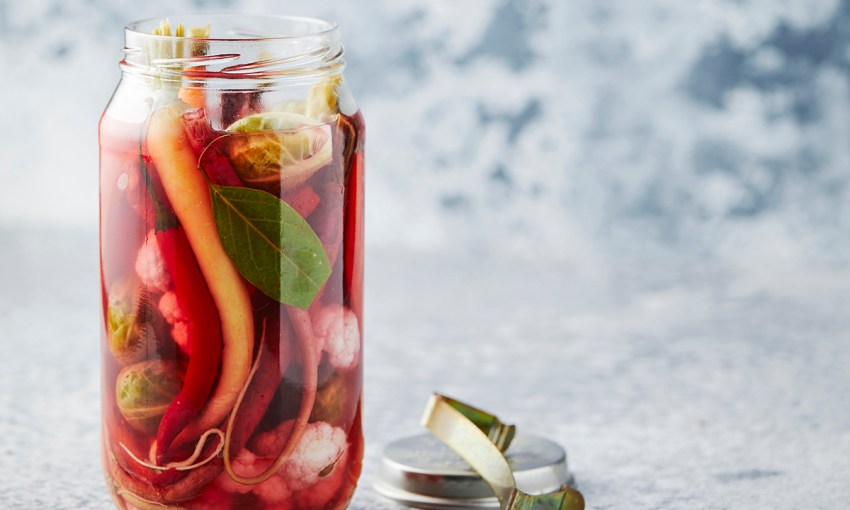
1kg mixed seasonal vegetables, such as carrots, cauliflower, red capsicum, tiny Brussels sprouts, peeled and cut up as necessary
½ cup salt
600ml white wine vinegar
100ml dry white wine
1 tbsp each salt and sugar
1-2 bay leaves
1 tbsp fennel seeds
1 clove garlic, peeled and sliced
1 whole chilli
olive oil
Place the prepared vegetables in a large glass or stainless steel bowl. Pour ½ cup salt over the vegetables and enough water to cover them. Let the vegetables soak in the salt water for at least 6 hours or overnight to draw out moisture.
Thoroughly rinse and drain the vegetables before dividing them up between the jars. Pack the vegetables in as tightly as you can. Place the bay, fennel, garlic and chilli in each jar. Bring the vinegar, white wine, sugar and salt to a boil. Pour the boiling brine over the vegetables leaving a little more than 2cm gap from the top. Pour the olive oil over the top. Wipe the rims with a wet paper towel and seal the jars.
If you plan to use the giardiniera soon, keep the jars in the fridge where they will keep for about a month. If you want the giardiniera for long-term storage, seal the jars with the lids and put them into a large saucepan with folded tea towels on the bottom. Fill with cold water and boil the jars for 20 minutes. Allow to cool in the water. These will store in a dark cupboard for up to a year. Refrigerate after opening.
Goan eggplant pickle
Makes 1.25 litres
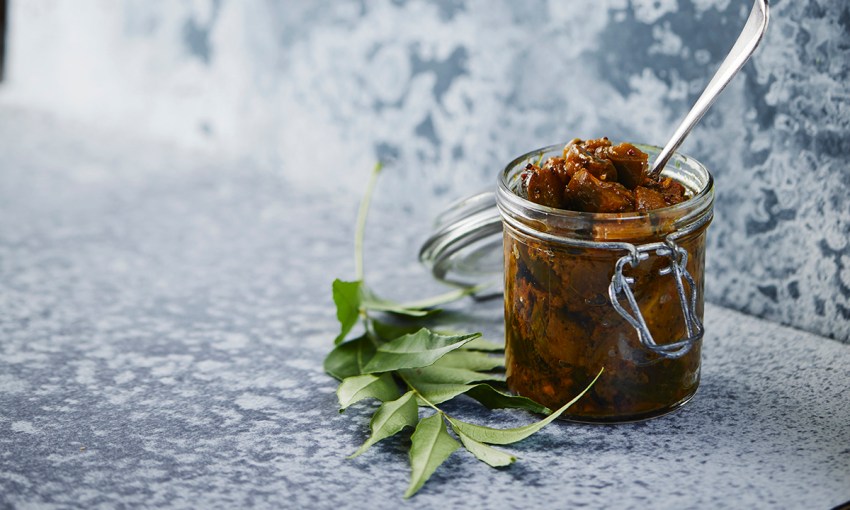
2 large eggplant, cut into 2cm dice
30g salt
125ml mustard seed oil or vegetable oil
1 tsp each fenugreek seeds and brown mustard seeds
3cm piece of ginger, finely grated
4 garlic cloves, finely grated
8 fresh curry leaves
5 red bird’s eye chillies
2 tsp ground turmeric
½ tsp garam masala
¼ tsp cumin seeds
250ml (1 cup) malt vinegar
50g raw sugar
Combine eggplant and salt in a colander and weigh down for 1 hour.
Heat oil in a large saucepan over medium-high heat, add fenugreek and mustard seeds and cook until seeds begin to pop. Add ginger and garlic and cook very briefly, then add eggplant, curry leaves, chillies and remaining spices, stirring frequently until eggplant is tender. Add vinegar, sugar and stir occasionally until vinegar reduces by two-thirds. While still hot, transfer to sterilised jars, seal. Eggplant pickle will keep for 2-3 weeks after opening but must be refrigerated.
Pickled green beans in oil (fagiolini sott’olio)
Makes 1kg
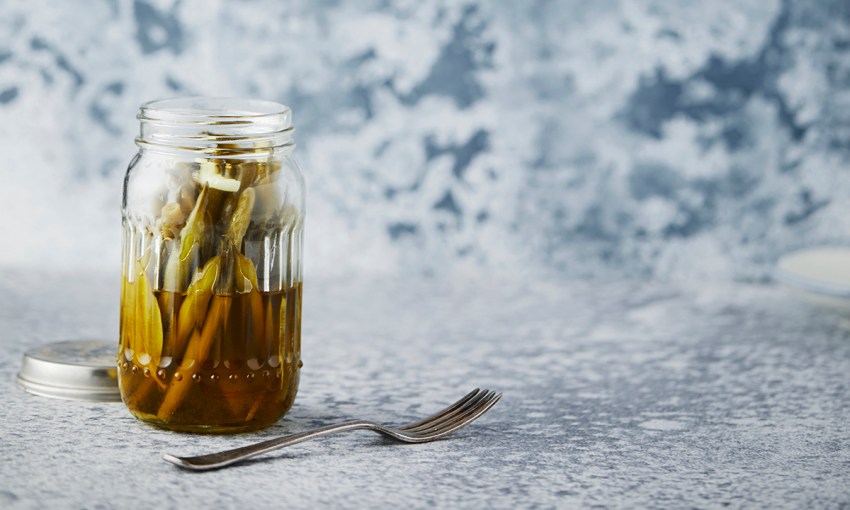
125ml wine vinegar
60ml white wine
125ml water
2 fresh bay leaves
12 peppercorns
1kg French beans, topped and tailed
extra virgin olive oil
2 cloves garlic, cut in half
zest 1 lemon
1 red chilli, shredded
In a large saucepan, bring to boil the vinegar, water and wine. Add 1 bay leaf, peppercorns and beans. Bring to boil and simmer for 3 minutes. Drain. Sterilise a jar or two and pour some olive oil into them. Put in a layer of beans while they are still warm, add 1 bay leaf, a sliver of chilli and half a clove of garlic, cover with oil and proceed until the jar is full. Press vegetables down with back of a spoon so no air is trapped. Oil must always cover the final layer of vegetables.
Pickled radishes
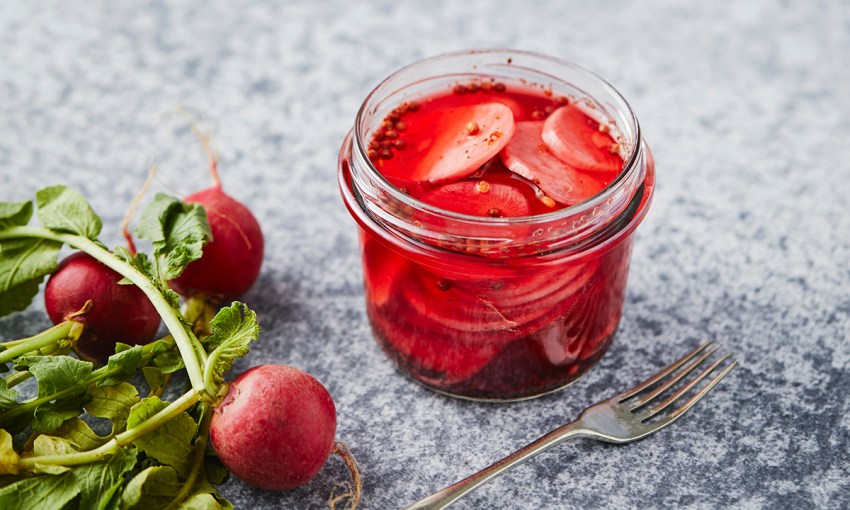
1 bunch radishes, sliced as thinly as possible
½ tsp dried chilli
½ tsp whole coriander seeds
½ tsp celery seeds
¾ cup apple cider vinegar
¼ cup water
¼ cup white sugar
2 tsp salt
Pack the radish slices into sterilised jars. Top with chilli, coriander and celery seeds.
In a small saucepan, combine the vinegar, water, sugar and salt. Bring the mixture to a boil, stirring occasionally, then pour over the radishes. Seal with a lid immediately. Allow to cool. You can serve the pickles immediately. They will keep well in the refrigerator for at least a month.
These recipes first appeared in the March 2019 issue of SALIFE magazine.
One Small Step is our guide to better living in South Australia.
To read more in our series, go here.



